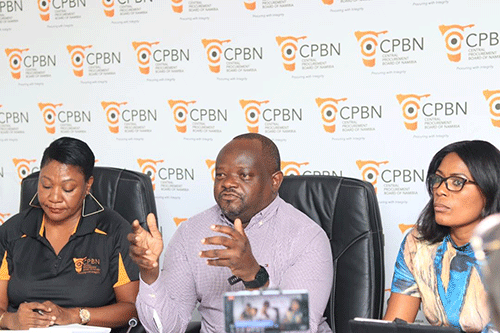Despite awarding him a multimillion dollar tender, the Central Procurement Board of Namibia does not know if businessman Shapwa Kanyama owns a condom or surgical gloves factory.
The CPBN conceded that no due diligence was done to determine whether businesses linked to Kanyama have actual manufacturing plants, or if they just exist on paper.
The only reason why his companies were favoured in State tender awards ahead of others, it is said, is because it presented itself as a ‘local manufacturer’.
This reality was conceded by the procurement board’s head, Amon Ngavetene.
The company under the spotlight is Amnics Trading, which won three money-spinning medical supply tenders from the health ministry.
One of them is valued at N$416.7 million, N$265.8 million more than the next bidder. Justifying the disparity, the CPBN said State entities are empowered by the Public Procurement Act to confer an advantage to local manufacturers, even if they are more expensive.
However, following complaints over Kanyama’s alleged condom-producing factory, the tenders are now under review. According to reports, his companies do not own a factory and employ only three people, and not 50 as stated.
Ngavetene made these remarks during a hastily-arranged press conference on Friday.
The event was necessitated by the process of awarding the controversial clinical products’ tender to Kanyama’s entity.
It further points to long-held assertions that the CPBN remains vulnerable to unscrupulous elements, and not bulletproof to corrupt practices.
That process is now under review and reconsideration, following a public outcry. Several companies have since submitted petitions to the board for it to reconsider the award.
That window period closed on Friday.
Factory faux pas
Ngavetene said before arriving at their decision, they relied only on a document from the labour ministry, submitted with Kanyama’s bidding consignment.
“Can we rely on that and be comfortable and say ‘yes, this means the person is manufacturing?’ Because it has been flagged, those are the issues that we are looking at as a board to have a determination of that aspect,” Ngavetene said while dropping the bombshell.
The official, who on the day appeared evasive, seemingly justified the award, despite not having all facts on the table.
“If you look at their company profile, there are issues around their [manufacturing] plant, machineries and whatever they have used for packaging or manufacturing. But I think [the legitimacy] is an issue that the board will still pronounce itself on,” Ngavetene added.
The procurement entity’s vetting process in the Kanyama case is questionable, said a CPBN insider.
“It is not possible to just rely on mere documents when it comes to massive tenders. Even for smaller tenders such as laundry services, we sent our team to go and inspect if the bidder has washing machines. Why did they not do this for such a big tender?” a person familiar with the CPBN’s operations asked.
A certificate of registration of a factory was issued to Amnics Trading on 20 July 2022, less than three months after the tender was advertised.
The condom factory, according to documents seen by New Era, is situated at erf 8042 WH1, 27 Birmingham Street in Windhoek’s northern industrial area.
“This is to certify that the above premises has on this day [20 June 2022] been registered as a factory under the Labour Act of 2007 for the manufacturing of disposable hygiene and pharmaceutical goods,” reads a section of the certificate.
A certain Mr D Shinime inspected the factory.
“We haven’t finalised the award. We would like to guard against the CPBN being seen to be discussing a particular bidder [Kanyama],” Ngavetene cautioned.
CPBN, he said, will be more inward-looking, going forward, particularly when it comes to its checks and balances.
This will help the country “improve its public procurement”.
Beyond that, only the Head of State can exercise his or her executive powers to block a tender deemed dubious.
Back in 2015, President Hage Geingob stopped the contentious N$7 billion airport upgrade tender in its tracks, citing irregularities in the manner the Namibia Airports Company had awarded it to a Chinese firm.
Three or 30 million?
Some reports suggested that Amnics Trading’s N$650 million tender includes the supply of surgical gloves for N$400 million, condoms for N$111 million, and other medical supplies.
These figures are now disputed by the procurement board.
According to the board, it erred when it released documents stating that the health ministry needed 30 million surgical gloves to be procured on its behalf.
Instead, the ministry only needs three million surgical gloves over the next two years, Ngavetene told reporters on the day.
“The correct quantity is three million. The CPBN is in the process of rectifying any computation errors and errors stated in quantities… the rectification of these errors may result in the reduction of the current recommended amounts from hundreds of millions to tens of millions,” he said without providing a definite amount.
The admission has stunned some industry players.
“There is no way the ministry of health, which has clinics, hospitals, health centres, community nurses and outreach programmes everywhere would only need three million surgical gloves. That is a lie.
Even a small entity like the Namibia Institute of Pathology uses around 50 million surgical gloves in less than six months. How can a whole ministry just need three million over two years?”, asked a ministry official, who preferred anonymity out of fear of reprisal.
When this was put to Ngavetene on Friday, he redirected the question to the ministry.
Yesterday, health ministry executive director Ben Nangombe was not reachable on his cellphone.


